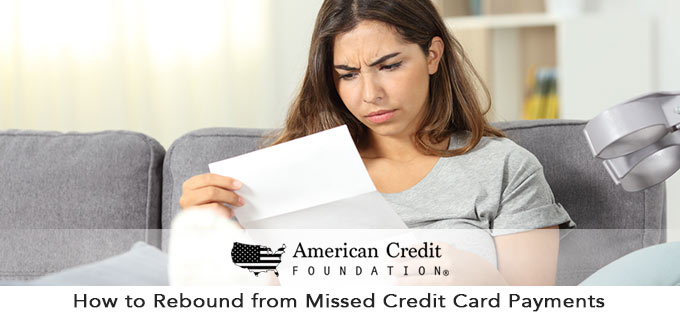
For whatever reason, you’ve missed your credit card payment… for the past four months. At first, maybe you just forgot to send in your monthly payment. Then you misplaced your next statement. You couldn’t afford the minimum amount on your third bill. And by month four, you were just overwhelmed.
Forget about how it happened. It’s time now to focus on how to correct it.
The Bad News: This Is Serious
The bad news is that missing or skipping your payments is a serious matter with numerous unpleasant repercussions. Even just a couple months’ worth of dodging your credit card bill will start you down a negative financial path.
You’ll see an ever-growing heap of late fees and interest charges. Your card’s credit line will shrink dramatically – if your issuer doesn’t simply close your account entirely. You will likely lose any rewards points you’ve accumulated. Your credit score will suffer.
The Good News: This Is Fixable
The somewhat-good news is that you aren’t headed to debtor’s prison for missing some credit card payments. (Some collectors might try to scare you with that threat, but it’s not likely anymore. Such penalties are usually saved for those who skip out on child support or taxes.)
Another piece of welcomed news? No one expects you to completely resolve that debt immediately. If you’re carrying a huge balance, chipping away at it consistently will go a long way in eventually paying it off and getting your creditors back on your good side. Taking responsibility for your credit card payment now – before you wind up defaulting – can make a huge difference for your credit status.
The Fix: This Is What You Do Today
Breathe. Don’t panic. Take your first step today.
Remember that your credit card company wants to help you. Not out of some altruistic humanitarian sentiment, but because when you pay off your debt, you’re paying them. So they want to help you find a way to start paying. And that solution will look different for different customers, depending on your unique situation.
- Stop it! Immediately stop using the offending credit card. Take it out of your wallet and stash it safely in a drawer. If your willpower to resist the plastic is really weak, consider shredding that card. You typically can’t close an account with a balance, but getting it out of your hands will prevent you from adding more to it (as long as you don’t use it for any online purchases as well!).
- Pay cash. Once you’ve gotten the offending card out of your wallet, make yourself pay cash for everything. This accomplishes two things: Many people see their spending decline when they hand over cold hard cash for every purchase, and they can use those saved dollars to start paying off their credit card balance.
- Make the call. Talk to your lender… today. You might feel embarrassed by a “red flag” on your account or scared of admitting you haven’t paid, but remember: No one’s judging you. For one, they need to know that you’re working to pay your bill. Otherwise you might end up on the collections phone tree (if you’re not there already). For another, they might have a hardship payment plan or other alternative payment solution that works well for your situation. They might be willing to lower your interest rate or even eliminate a portion of your late fees. You’ll never know your options until you ask.

The Long-Term: This Is Your Strategy Going Forward
- Create a budget. You can’t make a strong decision without a plan. Determine how much you bring in, then figure out your fixed expenses (car payment, mortgage, etc.). Next, calculate how much flexible income you can put to your credit card bills. Ideally that will be more than your minimum required payment until it’s paid off, but if that’s all you can swing, then at least do that.
- Start small. If you find yourself with more than one high-balance credit card, a wise strategy is to tackle the card with the balance you can knock out the fastest. If you can do that in one fell swoop, all the better! This morale booster might help you get your head above water and your financial confidence back on track.
- Plan your payback. To deal with multiple credit cards, while you’re focusing on zeroing out your lowest balance, be sure to keep paying (at least!) the minimum on the rest. Take on the rest of your balances by dealing with your credit cards in the following order: Pay off the highest balance with the highest interest rate, then the highest balance with the lowest interest rate, and finally the smallest balance with the lowest interest rate.
- Make it automatic. To keep yourself on track, automate your payments. Most lenders these days enable automatic bank account withdrawals through their online portals, where you can even create reminders of your upcoming payment to help you track your bank account. If not, your bank might be able to set something up to directly pay your monthly bill.
- Ask for help. If you’ve already spoken with your credit card issuer to work out your repayment arrangement but still can’t swing your monthly payment, consider a credit counseling service. Your counselor can offer budgeting and financial advice or set you up with a debt management plan to lower your monthly payment.
Regardless of the path you choose, it’s essential that you start down that path today. Does it all just feel like too much? Let our team help! Contact American Credit Foundation to begin planning your repayment plan – or for any other credit card concerns.